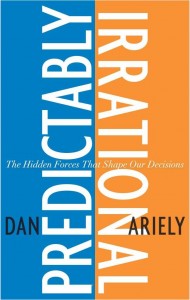Predictably Irrational
The Hidden Forces that Shape Our Decisions
by Dan Ariely
400 pages
Harper Collins, New York, 2008
This book is an interesting treatment of a topic with which I had been entirely unfamiliar. The author introduces the subject by considering his experiences while undergoing the painful treatments necessary for burn victims. While this personal story doesn’t seem to be overtly on topic, it seems that that is actually the root of this book. As the subtitle suggests, we are often slaves to the little things going on in the background of the mind. Behavioral economics appears to be a mix of psychology and the economy of the small scale. What makes the subject interesting is that the author and his team use small experiments to test theories of the sort that one may have independently imagined. Ariely extrapolates from these little experiments to more general meaning for human behavior.
Unfortunately, most of economics seems to negate the majority of naive right wing theories. I think some people could take the author’s translation of his findings into macroeconomics as “another sign of liberal bias,” but the neutral observer will find the evidence presented readily supportive of his claims. A notable exception to seeming liberal bias of economic reality is that the author’s research shows a specific improvement in honesty immediately following a particular religion-based exercise. As distasteful as I find this, I can certainly believe that certain people are more well behaved under threat of eternal damnation.
This is a topic I suddenly find fascinating. I will certainly be reading more on this in the future. I will let Ariely close out with his own words:
Standard economics assumes that we are rational, that we know all the pertinent information about our decisions, that we can calculate the value of the different options we face, and that we are cognitively unhindered in weighing the ramifications of each choice. The result is that we are presumed to be making logical and sensible conclusions. And even if we make a wrong decision from time to time, the standard economics perspective suggests that we will quickly learn from our mistakes, either on our own or with the help of market forces. On the basis of these assumptions, economists draw far-reaching conclusions about everything from shopping trends to law to public policy. But as the results presented in this book and others show, we are all far less rational in our decision making than standard economic theory assumes. Our irrational behaviors are neither random nor senseless. They are systematic and predictable.
…
Wouldn’t economics make a lot more sense if it were based on how people actually behave instead of how they should behave?
I think that tidily sums up the book.


Recent Comments